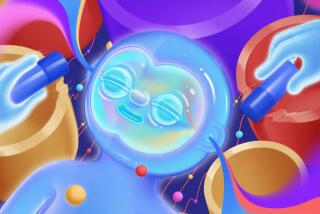Harp Sounds Soothe Newborns Who Are Battling for Survival
- Share via
NASHVILLE, Tenn. — Gentle melodies strummed on a 6-foot-tall harp lilt into nurseries where critically ill newborns cling to life at Vanderbilt University Medical Center.
“It just puts them in a more restful state,” says student musician Betty-Ashton Andrews, who is experimenting with using music to help the infants. “It makes it easier for them to grow and heal.”
There’s only budding scientific proof that such therapy helps newborns, but that doesn’t dissuade Andrews, 19, from conducting her weekly concerts at the hospital’s newborn intensive care unit.
Astride the gilded harp on the unit’s tile floor, Andrews coaxes lullabies, Disney tunes and classical music from its 52 strings, including requests (from adults) that range from “Amazing Grace” to Lynyrd Skynyrd’s “Freebird.”
Her audience, usually 150 babies, is tucked into incubators and surrounded by nests of tubes and wires--conduits from respirators, heart monitors and intravenous fluids. Nurses and parents say they note subtle changes in the babies when Andrews plays and most welcome any balm for a trying time.
Staff members say the music provides an antidote to the stress that comes with caring for, and sometimes losing, babies who are premature or fighting diseases.
For the babies, it muffles the frightening sounds of machines and unusual voices, and soothes them to sleep when their mothers can’t.
Diane Deslauriers, manager of the unit, said the babies’ heart rates seem to go down and they seem to rely less on their respirators when they hear the harp.
Christa Tuttle of Gallatin drove 50 miles round-trip each day to spend about 12 hours in the unit with her daughter, Caitlin. Born three months early on Jan. 29, Caitlin depended on a respirator the first three days to help her breathe.
Tuttle cannot say if Caitlin’s health improved because of the music, but she says she responded to it.
“Probably the one and only way you can tell is her alertness and her calmness,” Tuttle said when Caitlin was still in the unit. “She’s relaxed and able to look around and listen.”
Caitlin went home on March 19, and is “doing great. She is gaining weight much faster than when she was in the hospital. They say the home environment is best and I see that to be true,” her mother said recently.
Vanderbilt has not studied the effect of the music on the children, but Deslauriers said, “If I’m carrying a baby and she calms down, I don’t need a research study.”
Jayne Standley, professor of music therapy at Florida State University, has conducted several studies at Tallahassee Memorial Hospital’s newborn intensive care unit and has found babies who listened to lullabies left the hospital earlier than those who didn’t.
By hooking tape recorders to feeding tubes, researchers also found they could use lullabies to teach premature babies to nurse.
“If the baby gets 10 seconds of music and then it goes off, they learn to suck for at least 10 seconds to keep the music on,” Standley said.
Standley said research was needed to determine whether harp music was comforting to premature babies. Even though it is apparently soothing stimulation, she said premature babies are highly sensitive and the sounds could be disturbing to them.
At Vanderbilt, most babies dozed peacefully while Andrews played. Some were doted on by nurses and nervous mothers. Few showed signs of the restlessness sometimes exhibited by newborns hospitalized for the first weeks of their lives.
Andrews said she has had only a good response since first playing the harp for hospitalized newborns at Carilion Health System in her hometown of Roanoke, Va. Andrews, who is earning a degree in harp performance and considering one in music therapy, said she chose Vanderbilt in part so she could lend her music to the intensive care unit.
“I love to play the harp,” she said, and “I get to use it in a way that other people will benefit from it.”
Ron Price, who teaches harp and music education at Northern Illinois University in DeKalb, said many doctors are amazed at how quickly patients respond to the music.
“Some will say, ‘We don’t have anything in medicine that works that quickly,’ ” he said.
As executive director and co-founder of Healing Harps, Price trains harpists to work with people with physical or emotional problems to ease their pain.
“We do this all the time in hospitals across the country,” he said.
The harp’s magic lies in its acoustics, he said. It mimics the sound of the human voice and affects babies--and adults--like a lullaby.
“The music simply bathes them with healthy sounds,” he said. “It’s sort of like a sound massage.”
Information: On the Web: Healing Harps: https://www.healingharps.org
American Music Therapy Association: https://www.musictherapy.org
More to Read
Sign up for Essential California
The most important California stories and recommendations in your inbox every morning.
You may occasionally receive promotional content from the Los Angeles Times.













